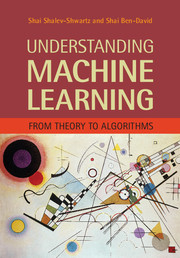Book contents
- Frontmatter
- Dedication
- Contents
- Preface
- 1 Introduction
- Part 1 Foundations
- 2 A Gentle Start
- 3 A Formal Learning Model
- 4 Learning via Uniform Convergence
- 5 The Bias-Complexity Trade-off
- 6 The VC-Dimension
- 7 Nonuniform Learnability
- 8 The Runtime of Learning
- Part 2 From Theory to Algorithms
- Part 3 Additional Learning Models
- Part 4 Advanced Theory
- Appendix A Technical Lemmas
- Appendix B Measure Concentration
- Appendix C Linear Algebra
- References
- Index
2 - A Gentle Start
from Part 1 - Foundations
Published online by Cambridge University Press: 05 July 2014
- Frontmatter
- Dedication
- Contents
- Preface
- 1 Introduction
- Part 1 Foundations
- 2 A Gentle Start
- 3 A Formal Learning Model
- 4 Learning via Uniform Convergence
- 5 The Bias-Complexity Trade-off
- 6 The VC-Dimension
- 7 Nonuniform Learnability
- 8 The Runtime of Learning
- Part 2 From Theory to Algorithms
- Part 3 Additional Learning Models
- Part 4 Advanced Theory
- Appendix A Technical Lemmas
- Appendix B Measure Concentration
- Appendix C Linear Algebra
- References
- Index
Summary
Let us begin our mathematical analysis by showing how successful learning can be achieved in a relatively simplified setting. Imagine you have just arrived in some small Pacific island. You soon find out that papayas are a significant ingredient in the local diet. However, you have never before tasted papayas. You have to learn how to predict whether a papaya you see in the market is tasty or not. First, you need to decide which features of a papaya your prediction should be based on. On the basis of your previous experience with other fruits, you decide to use two features: the papaya's color, ranging from dark green, through orange and red to dark brown, and the papaya's softness, ranging from rock hard to mushy. Your input for figuring out your prediction rule is a sample of papayas that you have examined for color and softness and then tasted and found out whether they were tasty or not. Let us analyze this task as a demonstration of the considerations involved in learning problems.
Our first step is to describe a formal model aimed to capture such learning tasks.
A FORMAL MODEL – THE STATISTICAL LEARNING FRAMEWORK
The learner's input: In the basic statistical learning setting, the learner has access to the following:
Domain set: An arbitrary set, χ. This is the set of objects that we may wish to label.
Information
- Type
- Chapter
- Information
- Understanding Machine LearningFrom Theory to Algorithms, pp. 13 - 21Publisher: Cambridge University PressPrint publication year: 2014
